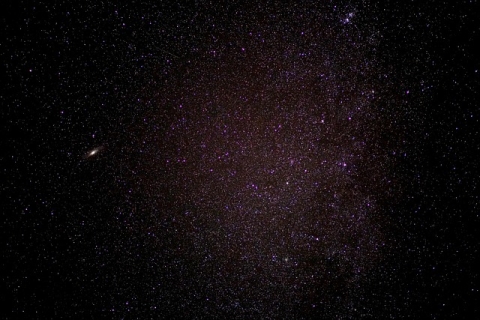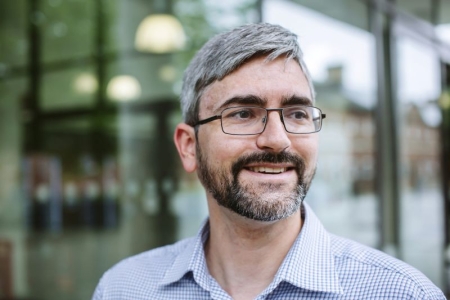

The University of Portsmouth is part of a ground-breaking £7 million project to investigate the furthest reaches of space
8 December 2023
6 min read
Researchers from UK universities are set to play a key role in developing the next generation of gravitational wave detectors, which could help astronomers probe the furthest reaches of the cosmos.
A consortium of seven British universities, including the University of Portsmouth, have secured £7m in support from the UK Research and Innovation (UKRI) Infrastructure Fund.
This fund helps to create a long-term pipeline of infrastructure investment priorities and supports the facilities, equipment and resources that are essential for researchers and innovators to do ground-breaking work.
Professor of Astrophysics, Andrew Lundgren, from the University’s Institute of Cosmology and Gravitation, said: “This new generation of detectors will allow us to find thousands of binary neutron stars, giving us a new window on the astrophysics of compact binaries.
“Portsmouth is already heavily involved in the current ground-based gravitational wave detectors, LIGO, Virgo and KAGRA, located in America, Italy and Japan, but this new project is about detectors more than a decade from now.”
Over the next three years, the consortium partners will develop designs for new mirror coatings, data analysis techniques, and suspension and seismic isolation systems for use in two future international gravitational wave detector development projects.
Those projects - Cosmic Explorer in the United States and the Einstein Telescope in Europe - are currently in the early stages of design work. They are expected to be fully constructed and online by the end of the next decade.
Gravitational wave detectors work by bouncing lasers between mirrors suspended at each end of long pipes often arranged in an L-shape.
As gravitational waves – the faint ripples in spacetime caused by enormous astronomical events like the collision of black holes - pass through the detectors, they cause miniscule variations in the distance between the mirrors measured by the lasers

The team at Portsmouth will be looking at new types of computing hardware, which is advancing all the time, and we’ll also be inventing new algorithms to make analysis faster and more efficient. It’s exciting to be part of a project that is likely to completely change our understanding of the universe.
Andrew Lundgren, Professor of Astrophysics
Analysis of the data captured during the passthrough of the gravitational waves can reveal a wealth of information about their origins in space.
Professor Lundgren added: “The next generation of detectors are going to be more sensitive and they’re going to see further, which means they’ll also be harder to analyse. The data will be richer and will cover more frequencies, so it will pose a really huge computational challenge.
“The team at Portsmouth will be looking at new types of computing hardware, which is advancing all the time, and we’ll also be inventing new algorithms to make analysis faster and more efficient.
“It’s exciting to be part of a project that is likely to completely change our understanding of the universe.”
Scientists from the UK, funded by the Science and Technologies Facilities Council (STFC), part of UKRI, have been involved in gravitational wave research for several decades.
They contributed to the design, mirror suspension technology and data analysis which underpins the current generation of gravitational wave observatories.
The LIGO observatory in the United States made the historic first detection of gravitational waves in 2015, opening up an entirely new field of astronomy which ‘listens’ for vibrations in spacetime instead of looking for information from across the electromagnetic spectrum. Since 2015, gravitational wave detectors have made spectacular discoveries – including of signals from more than 100 pairs of colliding black holes.
The next generation of detectors will be significantly more ambitious in their design, with lasers bounced between mirrors suspended free of external vibration placed up to 40km apart instead of 4km, as they are in current detectors. The mirrors, too, will be bigger and heavier as they double in diameter to around 60cm.
The international collaborations behind the planned next-gen detectors, expect that new observatories will be sensitive enough to detect signals from the very edge of the universe.
The expanded reach of the detectors will help cast new light on how black holes were formed in the earliest epochs of time, how matter behaves in neutron stars, and pick up gravitational waves which current observatories are unable to detect.
The newly-funded UK consortium brings together the universities of Birmingham, Cardiff, Glasgow, Portsmouth, Southampton, Strathclyde and the West of Scotland.
Professor Mark Thomson, Executive Chair of the Science and Technology Facilities Council (STFC) and UK Research and Innovation (UKRI) Champion for Infrastructure, said: “The detection of gravitational waves has been one of the most exciting recent developments in science and has provided us with entirely new way of observing the universe.
“This new UKRI investment will enable UK scientists to play a key role in the international effort to develop the next generation of even more sensitive gravitational wave observatories, which will greatly expand our understanding of the cosmos."
